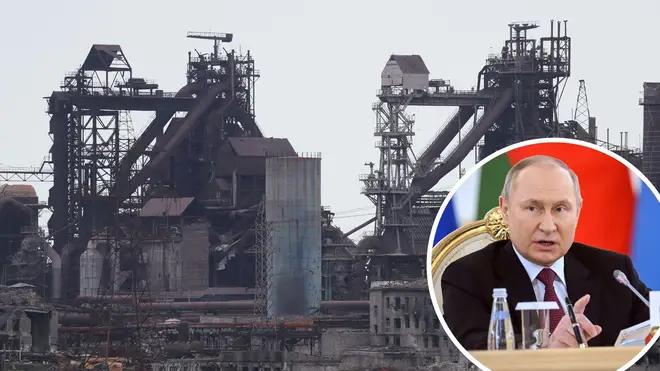
Oli Dugmore 4am - 7am
18 May 2022, 10:42 | Updated: 18 May 2022, 11:38

There are concerns Russia could renege on an agreement to free Ukrainian troops captured during the siege of Mariupol.
Ukrainian fighters from the Azovstal steelworks plant - the last pocket of resistance in the city - have been taken to a former penal colony in enemy-controlled territory.
Under a prisoner exchange deal, it was hoped they could be returned but a Moscow politician has now said they should be brought to "justice".
READ MORE: Finland and Sweden apply to join Nato - adding nearly a million troops to force
READ MORE: China plane crash that killed 132 was 'caused intentionally by someone in cockpit'
Vyacheslav Volodin, speaker of the lower house of the Russian parliament, insisted there were "war criminals" among the captured and "we must do everything to bring them to justice".
He did not provide evidence to support this.
The country's main federal investigative body said it intends to interrogate the troops to "identify the nationalists" and determine whether they were involved in crimes against civilians.
The Russian parliament plans to take up a resolution on Wednesday to prevent the exchange of Azov Regiment fighters, who held out for months inside the sprawling plant, according to Russian news agencies.
Russia's top prosecutor has asked the country's supreme court to designate the regiment, which has links to the far right, a terrorist organisation.
Ukraine's deputy defence minister, Hanna Maliar, said negotiations for the fighters' release were ongoing, as were plans to rescue soldiers who are still inside the plant.
Ukrainian President Volodymyr Zelensky said "the most influential international mediators are involved" in the plans.

"More weapons, more sanctions, until Ukrainians prevail," Truss says
More than 260 Ukrainian fighters - some taken out on stretchers - left the ruins of the Azovstal plant on Monday and turned themselves over to Russia in the deal negotiated by the warring parties.
An additional seven buses carrying Ukrainian soldiers from the plant were seen arriving at a former penal colony on Tuesday in the town of Olenivka, about 55 miles north of Mariupol.
Russia called it a surrender, but Ukrainians avoided that word and said troops in the plant had successfully completed their mission to tie down Russian forces and were under new orders.
Mariupol and Olenivka are officially part of Ukraine's eastern Donetsk region, but Olenivka has been controlled by Russia-backed separatists since 2014 and forms part of the unrecognised "Donetsk People's Republic".
Ukraine's human rights ombudsman Lyudmyla Denisova said the Russian military was also holding more than 3,000 civilians from Mariupol at another former penal colony near Olenivka.
She said most civilians are held for a month, but those considered "particularly unreliable", including former soldiers and police, are held for two months.
The Russian bombardment in Mariupol has killed more than 20,000 civilians, according to Ukraine, and those who remain - perhaps a quarter of the pre-war population of 430,000 - with little food, water, heat or medicine.

Minister convinced Finland and Sweden will join NATO
With the fighters' departures, Mariupol is on the verge of falling under complete Russian control.
However, this would be more of a symbolic boost for Russian president Vladimir Putin than a military win, according to retired French Vice Admiral Michel Olhagaray, a former head of France's centre for higher military studies.
"Factually, Mariupol had already fallen," he said.
But because of the Azovstal defenders' "incredible resistance", Ukraine can also claim that it came out on top, he added.
He said: "Both sides will be able take pride or boast about a victory - victories of different kinds."
The Ministry of Defence said on Wednesday that Ukraine's resistance in the strategic port city had cost Russia time and troops as it sought to capture a land corridor to the Crimean Peninsula, which it seized in 2014.
"Despite Russian forces having encircled Mariupol for over 10 weeks, staunch Ukrainian resistance delayed Russia's ability to gain full control of the city," the ministry said.
"This frustrated its early attempts to capture a key city and inflicted costly personnel losses amongst Russian forces."